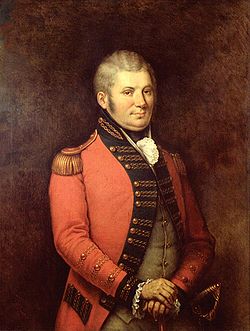“The victory was ruinous to our best soldiers”
In 1775 John Graves Simcoe was a lieutenant in the 35th Regiment of Foot, which had been sent to Boston.
Simcoe would go on to a notable career in the Crown forces and then in the government of Canada, but he missed the Battle of Bunker Hill, as he described in a letter written before the end of June 1775:
Simcoe would go on to a notable career in the Crown forces and then in the government of Canada, but he missed the Battle of Bunker Hill, as he described in a letter written before the end of June 1775:
On the 17th of this month, the first act of civil commotion commenced. The ship, I was in, was at sea; but, at a distance, we heard the sound of cannon, and, at midnight, saw two distinct columns of fire ascending. In this horrid state, well knowing we were the last of the fleet, ignorant whether Boston or some hostile town was in flames, were we kept for two days.That extract was published in 1782. As we might guess, it was brought to the public’s attention by Edward Drewe, whom Simcoe had such high praise for.
When we anchored, we saw Charles-Town burnt to ashes, and found our army had been engaged; that our troops were victorious, but that the victory was ruinous to our best soldiers, and particularly so to our officers, ninety-two of whom were killed and wounded.
The loss fell heavy on the flank companies of our regiment. [Edward] Drewe commanded the light infantry; exerting himself, at the head of that fine company, he received three shots through him, one in the shoulder, one in the bend of the thigh, the other through his foot. He also received two contusions, and his shoulder was dislocated. [Hugh] Massey is shot through the thigh, but says it is as well to be merry as sad. Poor [William] Bard was the third officer of the company. He was killed, speaking to Drewe. His dying words were, “I wish success to the 35th; only say I behaved as became a soldier.”
The sergeants and corporals of this heroic company were wounded, when the eldest soldier led the remaining five, in pursuit of the routed rebels. The grenadiers equalled their brethren, and, I fear, were as unfortunate. The brave and noble spirited Captain [James] Lyon, is dangerously wounded; and, to aggravate the misfortune, his wife, now with child, a most amiable woman, is attending on him. Both his Lieutenants were wounded.
The loss we have sustained, in the most warm and desperate action America ever knew, draws tears from every eye interested for brave and unfortunate spirits. Had I time to enumerate to you the many instances which the soldiers of our companies, alone, afforded the most generous exertions of love, fidelity, and veneration for their officers, and of the glowing, yet temperate resolutions of these officers, your tears would be those of triumph, and you would confess that in war alone human nature is capable of the most godlike exertions. I think you will believe me abstracted from friendship, when I say, that I never heard of more courage and coolness than Drewe displayed on that day; and his spirits are, even now, superior to any thing you can conceive.


No comments:
Post a Comment